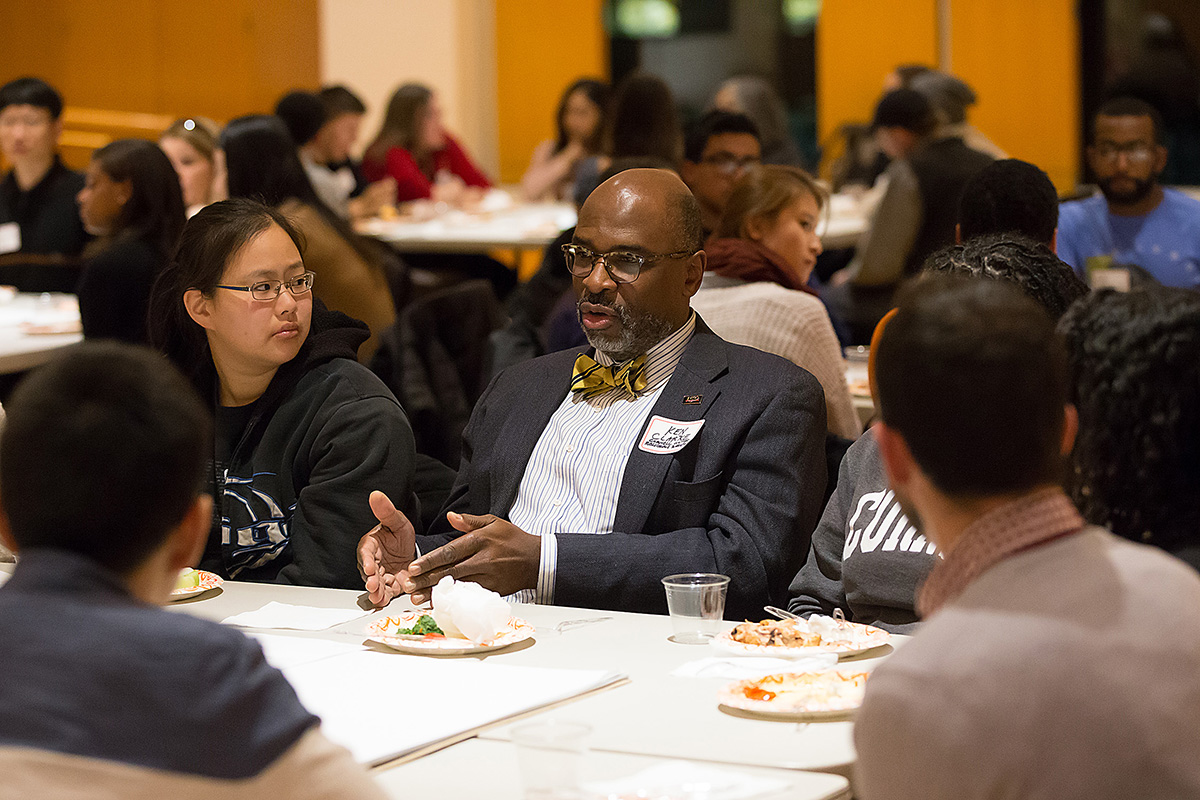Breaking Bread discussion centers on religion
By Daniel Aloi

About 60 students, staff and faculty members met over dinner at a “Breaking Bread” event Feb. 10 to share their experiences and perspectives on race, religion and campus climate.
Student facilitators led small-group discussions in G10 Biotechnology, prompting conversations on subjects including “how social identity affects our perception of our own religion and how much we identify with religion”; the complexities of racial and cultural background and ethnicity; and religion being just one component of a person’s identity.
“Religion doesn’t really come to the forefront for me because since I’ve claimed to be a science major, you can’t really associate religion with your science,” a female graduate student said. “So, therefore, I am two different individuals in that aspect.”
Leticia,a junior in the College of Agriculture and Life Sciences and a teaching assistant for the Intergroup Dialogue Project, facilitated one group from a variety of backgrounds – predominately Catholic but also Baptist and Muslim, with parents who were Muslim, Christian or Jewish. Several now identified as agnostic or atheist.
“I’ve been Christian since birth and have had some problems with that,” one student said. “I visited Israel last summer and re-found my faith.”
Chris, a graduate student in plant sciences, said he came from “the mid-Midwest, it’s pretty rural. There was a lot of pressure to fit into the white male stereotype … everything about my home is Mexican, then I go to school and it’s like, I’m a white male. Growing up on those two lines was very interesting.”
In the Boy Scouts, “a few of the parents that were leaders were very, I would almost say aggressively, religious; they pushed their religion down onto everyone … into that white male Christian mold.”
Leticia also shared her background. “I’m from the Dominican Republic and I identify as multiracial – black, of European descent and indigenous. But being here at Cornell my identity as a scholar has allowed me to see religion as a sort of pathology, a sort of disease,” she said.“Historically my people have been forced to be Catholic, and it’s still something you see today with European missionaries in my community.”
The talk of racial and ethnic identity turned to micro-aggressions based on perceptions – including such seemingly innocuous questions as “where are you from?”
“We sometimes try to label and categorize, and the difference between what is ascribed to you and what you are personally about, is huge,” said Kim Kenyon, associate director of the Center for Teaching Excellence.
Rehana, a staff member, said, “There’s a certain physicality to identity that no matter what religion or what multiracial origins you have, it’s not with a bad intention but there’s something that people will relate you to, based on how you look.”
Summing up the hour of discussion, one facilitator said: “A lot of us were trying to reconcile our relationship with religion. Many at our table were born into families who were very devout in their church, but later in life they leave the church.”
At another table: “We had this wideness of different identities. We had a Christian nondenominational, we had a Seventh-Day Adventist, we had an agnostic, and so on. We were also talking about what these experiences had done for us.”
A previous Breaking Bread event on campus in November focused on race and campus climate. The initiative grew out of a discussion series held at 6-2-6, the Center for Intercultural Dialogue. “The purpose of these discussions is to build greater understanding, and to dispel stereotypes and biases and just create better community,” Associate Dean of Students Renee Alexander said in her introduction.
The next Breaking Bread event in April will feature a discussion of politics and campus climate.
Media Contact
Get Cornell news delivered right to your inbox.
Subscribe